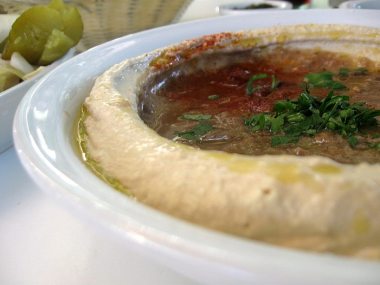Lebanese Hummus in Tel-Aviv
During the recent “Hummus War” most Israelis were less worried about who wins and mainly became curious about how the Lebanese version of the dish tastes. And so, Lebanese hummus places in Tel-Aviv seem to do very well these days.
Some 120 years ago, my great grandfather, Zeev, found love in Lebanon. He married my great grandmother, Mathilda, and took her back to his hometown, Sefad. That’s only one eighth of my blood, but that’s a very important eighth.
 So when people ask me what my family origins are, I tell them “from Sefad” but that I have some Lebanese origins as well.
So when people ask me what my family origins are, I tell them “from Sefad” but that I have some Lebanese origins as well.
Topographically speaking, the mounts of Galilee (in the north of Israel) and a large part of Lebanon, are one geographical entity. There’s a natural resemblance in the foods and food culture of the two places, which were also both under the strong influence of Syria and the great Ottoman empire for hundreds of centuries.
So, I’m not surprised that every time I taste Lebanese hummus – or one the is said to be that – it tastes different. I think that like Israeli/Palestinian hummus, there’s no one single recipe but numerous genres and dialects, that tell a glorious story that is old – but sure is kicking.
Lebanese hummus in Tel-Aviv
Most Israelis I know did not take the hummus war with Lebanon too seriously. If anything, the discussion over this alleged rivalry has made the hummus enthusiasts is Israel more curious about the Lebanese version of the dish.
Naturally, as an Israeli you don’t have many opportunities to eat hummus made by Lebanese. Lebanese restaurants are a preferred choice for Israelis when abroad, mainly because they make the real thing – not a distorted version aimed to please the local taste.
There are some Israeli’s of Lebanese origin and some of them even own hummus places, but until recently you had very few places that were actually worth going to, and that seems to change.
Recommended TLV hummus places
One popular place, Hummus Echad-Ha-am (59 Nachlat Benyamin, Tel-Aviv), demonstrates an interesting interpretation of the Lebanese subject. The Lebanese chef of this semi-yappi place makes a very creamy hummus and tahini, and season it with bits of mint and coriander, in addition to the customary parsley.
 By the way, if you show the above picture to any Lebanese, he’ll tell you right away what’s wrong with it: the boiled egg should not have been there.
By the way, if you show the above picture to any Lebanese, he’ll tell you right away what’s wrong with it: the boiled egg should not have been there.
Technically, that combination of hummus with ful (broad beans) and a boiled egg comes from Jerusalem, not Lebanon, but lets leave this for another post.
Another place, that I personally like better, is Hummus Zahlawi (202 Ben Yehuda). It’s called after the Lebanese city of Zahlah, were Muhamed Raad – the chef and one of the owners – was born and raised.
Though good istelf, Zahlawi’s hummus is not very different than what you’d expect when eating other Israeli/Palestinian good hummus.
In this place, you’d feel the Lebanese flavors and scents mainly in the vegetable salad, the coffee and the Mahlabi (the local version of the ancient Blancmange). They also serve Zahlawi Arak, a traditional alcoholic beverage from Lebanon that is also very popular in Israel.
Both places seem to go a long way to meat the Israeli taste, but both make good hummus with a Lebanese touch.
What is in the middle of the hummus in the picture, apart from the egg and parsley, is it lentil soup?
It’s ful – a stew of cooked broad beans/
thanks!
is the ful served hot on a cold hummus? or the ful is also cold?
Traditionally, the ful is kept hot in a large tall pot and is at list warm when served.